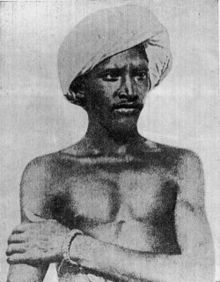
Birsa Munda (1875–1900) was an Indian revolutionary tribal freedom fighter, religious leader, and folk hero who belonged to the Munda tribe. Birsa Munda was a patriot. He took an active part in the fight for freedom.
Birsa Munda was born on November 15, 1875, in the village of Ulihatu in present-day Jharkhand.
Birsa converted to Christianity to join the German Mission School as it was mandatory to convert to Christianity to join the school and was renamed Birsa David, later changed to Birsa Daud.
Birsa left the German Mission School after studying for a few years.
When British wanted to turn the tribal farming system into a feudal government, Birsa Munda resumed the fight for the tribes through religious domination and confronted the Christian missionaries. He worked to reform religious practices, discouraged many superstitious rites, introduced new principles and prayers, and worked to restore tribal pride.
Because of British atrocities, Birsa Munda also became involved in anti-missionary and anti-establishment activities between 1886 and 1890 in Chaibasa.
He mobilized thousands of tribal people to form guerrilla armies to attack the British Raj.
He spearheaded an Indian indigenous tribal religious millennial movement that emerged in the tribal belt of present-day Bihar and Jharkhand in the late 19th century, during the British Raj, making him an important figure in the history of the Indian independence movement.
He assembled a large religious movement against the British missionaries and their conversion activities. He rebelled against the religious conversion activities of Christian missionaries, mainly with the help of the Munda and Oraon tribal communities.
Birsa witnessed the movement Sardari Larai movement during the 1880s: , demanded to restore tribal rights through non-violent methods like sending petitions to the Raj. The oppressive colonial regime paid no attention to these demands.
Birsa fought with the British with indomitable courage and utter valor. He organized an armed protest against financial power.He invoked the sovereignty of the ancestral autonomous control of the tribes over the land.
Because of his struggles In 1908, the Chotanagpur Tenancy Act was passed to prevent the local tribes from reclaiming their land. Chhota Nagpur Tenure Act 1908: restricted the transfer of tribal land to non-tribal. The British regime also took steps to abolish Veth Bigari or forced labour.
He was severely tortured in prison. He died there due to diarrhea. He died only at the age of twenty-five.
Many landmarks such as airports, stadiums and academic institutions named after the symbol of tribal identity, Birsa Munda.In honor of his sacrifice, his portrait has been erected in the Central Assembly Building of the Parliament of India.
Birsa’s life was an example for others. He is an Icon of courage, bravery and leadership to millions.
Birsa’s bravery and patriotism will never be forgotten. Even today he lives in the heart of every Indian.